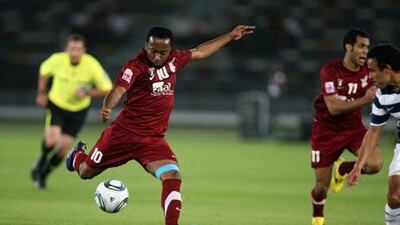Ismail Matar has been considered the preeminent Emirati footballer for more than eight years, going back to when he won the Golden Ball at the 2003 Under 20 World Cup.
But the diminutive forward now concedes that the mental baggage of a troublesome knee left him at something less than his best the past two seasons, and he hopes that corrective therapy in Germany allows him to return to top form for club and country.
"My knee has given me some problems. It was not something that happened in a game, but it has been a niggle in the last two years," he said.
"It played up on the back of my mind when you are not sure the seriousness of the injury. I always had that fear. I feel free from that now and can concentrate in my game."
Matar has scored as many as 14 league goals in a season and has produced six goals for the national team in a single year. But he scored only six league goals for Al Wahda last season, and five the season before, and his national team scoring total stands at only two in 2010 and 2011.
Josef Hickersberger, his coach for three seasons at Wahda, believes his influential forward will regain the form of his past.
"I see a reason for his inconsistent performance in recent years," said the Austrian. "He is a very sensitive person and gets very worried about his health and the injuries. For that reason, he was unable to play his usual game.
"He was missing too many training sessions and that was one of the main reasons he was unable to deliver the same performance as when he was at his peak.
"Now that problem is solved after the treatment he underwent in Germany during the summer. And yes, I am very positive of Ismail getting back to his best. He was really ambitious when he returned. He told me he wants to get back to his best and wanted to play for the national team against South Korea."
Matar is pleased he was able to avoid surgery, but he conceded that he is not yet at full strength. Nevertheless, he will join the national team this weekend and hopes to play in the 2014 World Cup qualifier away to South Korea on October 11.
"When I was asked if I was fit enough, I told them I will be 75 per cent fit in time for the game against South Korea," he said. "It is a critical game and I feel I can do something. All we need is a good result with Korea and we will be back in the race. And I wish we will."
Matar's desire to play against South Korea is understandable. This could be his last chance to play in a World Cup, a dream of any player. He is 28 and had mentioned he would retire before the next World Cup in 2018.
That the national side missed him seems clear; he was absent for the games with Kuwait and Lebanon, and the UAE lost 3-2 and 3-1 to fall to the bottom of their group with four matches left.
Hickersberger questions the wisdom of his player pushing himself to return to the national team.
"I understand he wants to give his best for his country but I don't think him being 75 per cent fit is good enough to play against South Korea away, which is the toughest game in the group for the UAE," he said. "It is too risky."
Matar has not played a full game since his return. He was called up in the last 10 minutes in the Super Cup and scored a vital goal from a spot kick in the 7-6 penalty shoot-out win over Al Jazira.
"Ismail is one of those players who can change the game at any time during a game," Hickersberger said. "He can create goals, score by himself and more importantly out think the opponent.
"He may not have been successful in scoring goals in recent times but he is still the best player we have around."
Hickersberger said Matar has been a marked man since that 2003 youth World Cup, as well as since he led the UAE to the 2007 Gulf Cup championship by scoring five goals in five matches.
"One must understand that Ismail is one of the closely marked players by any opposition," the coach said. "That in itself shows the respect the others show for him."
He said he expects his veteran to stand out, even in a league that now boasts numerous elite foreign scorers.
"This season we see a host of international players like Grafite, Asamoah Gyan, Mariano Donda, Matias Delgado, and I would place Ismail among them," Hickersberger said. "For me, his best position is to play behind two strikers or lone striker. He can create chances and he can score because he has speed and the technique, and if he's fit, he is special."
Follow
The National Sport
on
& Amith Passela on


